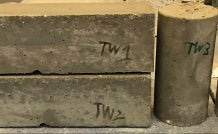Apr 24 2018
A pioneering, innovative method that involves the application of nanoengineering technology to include graphene in conventional concrete production has been developed by researchers at the University of Exeter.
 Innovative new “green” concrete using graphene. (Image credit: Dimitar Dimov)
Innovative new “green” concrete using graphene. (Image credit: Dimitar Dimov)
When compared to the prevalent concretes, the new composite material is more than four times more water resistant and twice as strong and can be directly used on building sites by the construction industry. All the tested concrete samples are compliant with the British and European construction standards.
Most importantly, the innovative graphene-reinforced concrete material also considerably minimized the carbon footprint of traditional concrete production techniques, rendering it more environment-friendly and sustainable.
The researchers asserted that the new technology could open the door for the incorporation of other nanomaterials into concrete, thereby further modernizing the construction industry across the globe.
The study has been reported on Monday, April 23, 2018, in the Advanced Function Materials journal.
According to Professor Monica Craciun, co-author of the paper, who is from Exeter’s engineering department, “Our cities face a growing pressure from global challenges on pollution, sustainable urbanization, and resilience to catastrophic natural events, amongst others.”
“This new composite material is an absolute game-changer in terms of reinforcing traditional concrete to meets these needs. Not only is it stronger and more durable, but it is also more resistant to water, making it uniquely suitable for construction in areas which require maintenance work and are difficult to be accessed.”
“Yet perhaps more importantly, by including graphene we can reduce the amount of materials required to make concrete by around 50 percent—leading to a significant reduction of 446kg/tonne of the carbon emissions.”
“This unprecedented range of functionalities and properties uncovered are an important step in encouraging a more sustainable, environmentally-friendly construction industry worldwide.”
The focus of earlier studies on the application of nanotechnology has been on altering prevalent components of cement, one of the principal elements for concrete production.
In this innovative research, the researchers have developed a new method that focuses on atomically blending thin graphene in water with no defects, high yield, and low cost, ensuring compatibility with advanced, large-scale manufacturing demands.
This ground-breaking research is important as it can be applied to large-scale manufacturing and construction. The industry has to be modernised by incorporating not only off-site manufacturing, but innovative new materials as well.
Finding greener ways to build is a crucial step forward in reducing carbon emissions around the world and so help protect our environment as much as possible. It is the first step, but a crucial step in the right direction to make a more sustainable construction industry for the future.
Dimitar Dimov, Lead Author - University of Exeter
The paper titled “Ultrahigh Performance nanoengineered Graphene-Concrete Composites for Multifunctional Applications” has been published in the Advanced Functional Materials journal.
The UK’s Engineering and Physical Sciences Research Council (EPSRC) supported the study.